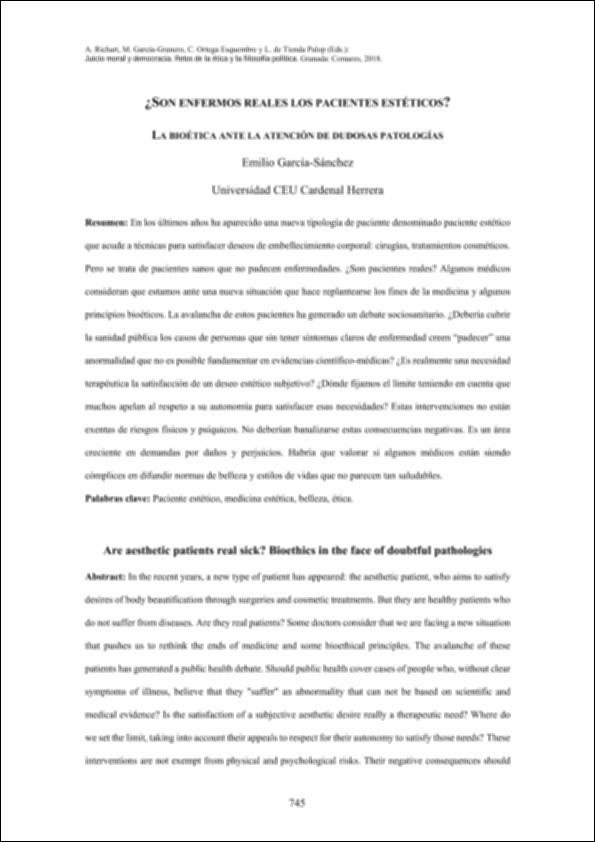Please use this identifier to cite or link to this item:
http://hdl.handle.net/10637/10470¿Son enfermos reales los pacientes estéticos? : la bioética ante la atención de dudosas patologías
| Title: | ¿Son enfermos reales los pacientes estéticos? : la bioética ante la atención de dudosas patologías |
| Other Titles: | Are aesthetic patients real sick? : bioethics in the face of doubtful pathologies |
| Authors : | García Sánchez, Emilio |
| Keywords: | Bioethics.; Estética.; Beauty, Personal.; Aesthetics.; Bioética.; Belleza corporal. |
| Publisher: | Comares |
| Citation: | García Sánchez, E. (2018). ¿Son enfermos reales los pacientes estéticos? : la bioética ante la atención de dudosas patologías. En Richart, A., García Granero, M., Ortega Esquembre, C. y Tienda Palop, L. de (eds). Juicio moral y democracia : retos de la ética y la filosofía política (pp. 745-754) . Albolote (Granada): Comares. ISBN 978-84-9045-661-3. |
| Abstract: | En los últimos años ha aparecido una nueva tipología de paciente denominado paciente estético que acude a técnicas para satisfacer deseos de embellecimiento corporal: cirugías, tratamientos cosméticos. Pero se trata de pacientes sanos que no padecen enfermedades. ¿Son pacientes reales? Algunos médicos consideran que estamos ante una nueva situación que hace replantearse los fines de la medicina y algunos principios bioéticos. La avalancha de estos pacientes ha generado un debate sociosanitario. ¿Debería cubrir la sanidad pública los casos de personas que sin tener síntomas claros de enfermedad creen “padecer” una anormalidad que no es posible fundamentar en evidencias científico-médicas? ¿Es realmente una necesidad terapéutica la satisfacción de un deseo estético subjetivo? ¿Dónde fijamos el límite teniendo en cuenta que muchos apelan al respeto a su autonomía para satisfacer esas necesidades? Estas intervenciones no están exentas de riesgos físicos y psíquicos. No deberían banalizarse estas consecuencias negativas. Es un área creciente en demandas por daños y perjuicios. Habría que valorar si algunos médicos están siendo cómplices en difundir normas de belleza y estilos de vidas que no parecen tan saludables. / In the recent years, a new type of patient has appeared: the aesthetic patient, who aims to satisfy desires of body beautification through surgeries and cosmetic treatments. But they are healthy patients who do not suffer from diseases. Are they real patients? Some doctors consider that we are facing a new situation that pushes us to rethink the ends of medicine and some bioethical principles. The avalanche of these patients has generated a public health debate. Should public health cover cases of people who, without clear symptoms of illness, believe that they "suffer" an abnormality that can not be based on scientific and medical evidence? Is the satisfaction of a subjective aesthetic desire really a therapeutic need? Where do we set the limit, taking into account their appeals to respect for their autonomy to satisfy those needs? These interventions are not exempt from physical and psychological risks. Their negative consequences should not be trivialized. It is a growing area in claims for damages. It should be assessed whether some doctors are being complicit in spreading beauty norms and lifestyles that do not seem so healthy. |
| Description: | El libro "Juicio moral y democracia" recoge una selección de las contribuciones que se presentaron en el IV Congreso Internacional de Bioética celebrado en Valencia, del 7 al 9 de noviembre de 2016. |
| URI: | http://hdl.handle.net/10637/10470 |
| Rights : | http://creativecommons.org/licenses/by-nc-nd/4.0/deed.es |
| ISBN: | 978-84-9045-661-3. |
| Issue Date: | 1-Jan-2018 |
| Center : | Universidad Cardenal Herrera-CEU |
| Appears in Collections: | Dpto. Ciencias Políticas, Ética y Sociología |
Items in DSpace are protected by copyright, with all rights reserved, unless otherwise indicated.


